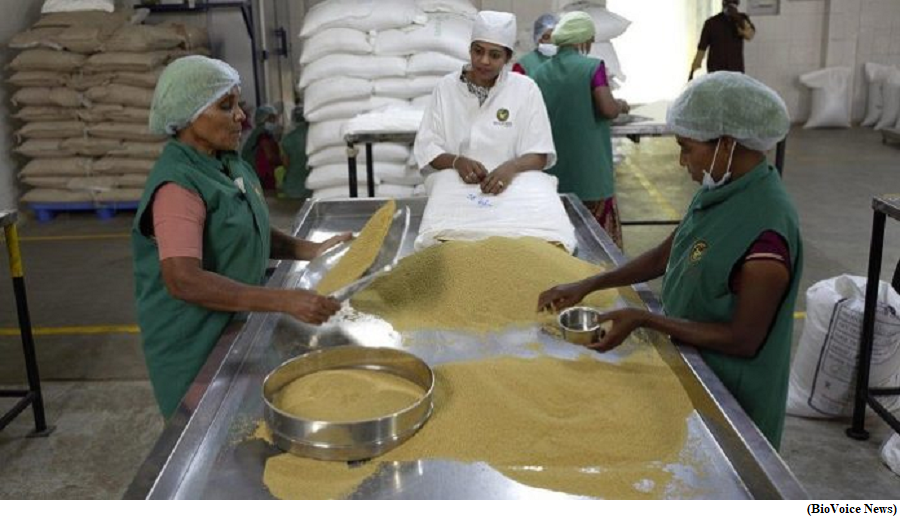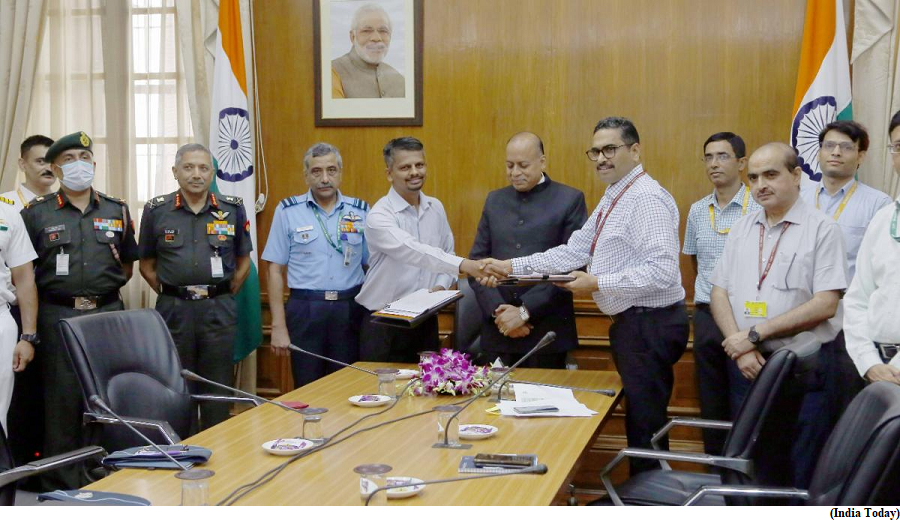Codex Alimentarius Commission Praises India’s Standards on Millets (GS Paper 3, Economy)

Why in news?
- The Codex Alimentarious Commission (CAC) has praised India’s Standards on Millets and accepted its proposal for the development of global standards for millets during its 46th session held in Rome, Italy.
India’s proposal:
- India has framed a comprehensive group standard for 15 types of millets specifying 8 quality parameters, which received resounding applause at the international meet.
- Codex currently has standards for Sorghum and Pearl Millet.
- India put forward a proposal for the development of global standards for millets, particularly for Finger millet, Barnyard millet, Kodo millet, Proso millet and Little millet as group standards as in case of pulses.
- The proposal was unanimously endorsed in the session at FAO Headquarters in Rome.
Group standards on millets:
- The group standards on millets framed by FSSAI for 15 types of millets, which specify 8 quality parameters i.e., maximum limits for moisture content, uric acid content, extraneous matter, other edible grains, defects, weevilled grains and immature and shriveled grains, will act as an important foundation for the development of global standards.
- The existing Codex standards for Sorghum and Pearl millet would also be reviewed while making the group standards for millets.
India’s proposals so far:
- The current session marks the 60th anniversary of the Codex Alimentarius Commission, of which India has been a member since 1964.
- India has so far chaired 12 EWGs and co-chaired 28 EWGs relating to various Codex standards/texts and guidelines.
- Important standards proposed by India include Standard for Okra, BWG Pepper, Aubergines, Dried and Dehydrated Garlic, Dried or Dehydrated Chilli Pepper and Paprika, Fresh Dates, Mango Chutney, Chili Sauce, Ware Potatoes and labelling requirements for non- retail containers.
About Codex Alimentarious Commission (CAC):
- It is an intergovernmental body established jointly by the UN’s Food and Agriculture Organisation (FAO) and the World Health Organisation (WHO) in 1963, within the framework of the Joint Food Standards Programme.
- The Secretariat of the CAC is hosted at FAO headquarters in Rome.
- It was established to protect the health of consumers and ensure fair practices in the food trade.
- It meets in regular session once a year alternating between Geneva and Rome.
- Currently, it has 189 Codex Members made up of 188 Member Countries and 1 Member Organization (The European Union).
Drought emergency declared by 23 countries in 2022-23
(GS Paper 3, Environment)
Why in news?
- At least 23 countries, including India, declared drought emergencies at a national or sub-national level during 2022-23, showed new data from a global drought map compiled by the United Nations.
- The report ‘Global Drought Snapshot’ was launched by the UNCCD at the outset of the 28th Conference of Parties (COP28) to the UN Framework Convention on Climate Change (UNFCCC) climate talks in Dubai.

Key Highlights:
- Based on reporting by 101 Parties to the UN Convention to Combat Desertification (UNCCD), 1.84 billion people were drought stricken, out of which 4.7 per cent were exposed to severe or extreme drought.
European Nations:
- An emergency was declared in 23 countries due to the impact of drought. Of these, Europe had the highest number (8); Spain, Italy and United Kingdom declaring it in April, May and July 2023, respectively, while Greece, Portugal, Romania and Serbia in July 2022.
- Drought and drought-like conditions spread to many European countries both in 2022 and 2023. The countries faced blistering heat and recorded their hottest summers.
- In 2022, the continent recorded its largest overall drought impacted area; over 630,000 square kilometres, as opposed to the 167,000 square kilometres annual average between 2000 and 2022.
Other countries:
- In recent years, droughts have expanded their territory and intensity. According to the map, United States and Canada also declared drought emergencies in January 2022 and March 2023, respectively.
- In Asia, five countries declared drought — India and Sri Lanka in August 2023, Indonesia in July 2023, Kazakhstan and China in April and May 2022, respectively.
- Simultaneously, South American country Uruguay and the African countries of Niger, Djibouti, Cabo Verde and Mauritania also declared drought emergencies in 2022-23. Other countries included Kiribati, the Marshal Islands, and Tuvalu.
- The Horn of Africa faced its worst drought in 40 years, with Ethiopia, Kenya and Somalia particularly hard hit. Five consecutive failures of rainfall seasons wreaked havoc over large parts of East Africa and contributed to reduced agricultural productivity, food insecurity and high food prices
Extreme heat:
- The year 2023 has broken several records when it comes to extreme heat.
- On November 17, 2023, the world breached 2 degrees Celsius of warming, a number the world was constantly warned of not crossing.
Impact of drought:
- Droughts have a cascading effect, from dwindling reservoir levels to declining crop yields, from loss of biological diversity to famines and serious economic consequences, especially in agriculture dependent regions where drought-related crop failures lead to food shortages and often skyrocketing prices, potentially disrupting global food supply chains.
- The economic losses associated with the disaster were estimated to be in the billions of dollars annually.
Facts:
- UNCCD is one of three Conventions originated at the 1992 Earth Summit in Rio de Janeiro. The other two address climate change (UNFCCC) and biodiversity (UN Convention on Biological Diversity).
- Data revealed that 85 per cent of people affected by droughts live in low-or middle-income countries. Moreover, 98 per cent of the 32.6 million new disaster displacements in 2022 were the result of weather-related hazards such as storms, floods and droughts.
- The report was launched at a high-level event in Dubai with the International Drought Resilience Alliance, a collaborative platform, launched at the UNFCCC COP27 in 2022, led by the governments of Senegal and Spain.
iDEX-DIO signs 300th contract for Defence Innovation
(GS Paper 3, Defence)
Why in news?
- Innovations for Defence Excellence (iDEX), the flagship initiative of the Department of Defence Production, has reached a milestone with the signing of its 300th contract recently.

GaN components:
- The contract relates to the design and development of advanced Gallium Nitride Semiconductors which is essential for the next generation of wireless transmitters in defence applications ranging from radars to EW (Electronics Warfare) jammers.
- Currently, almost all GaN components are imported being a sensitive and cutting-edge technology whose export is controlled and restricted by many countries.
- The proposal aims to design, develop and manufacture.
- GaN components for defence in India using completely indigenous GaN technology. This would significantly enhance the indigenous design & development capability, paving way for immense potential in the defence sector including exports.
Procurement contract:
- In another development, BEL signed a procurement contract with the iDEX Winner M/s Blurgs Innovations Private Limited for their solution TRIDENT, which is an intelligent maritime domain awareness tool with a robust solution designed to enhance maritime security. This solution assists in building superior maritime domain awareness by relying on anomalous detection and would aid in quicker decision making.
- This is a first procurement order placed by a Defence Public Sector Undertakings (DPSUs) under the iDEX scheme.
iDEX framework:
- The iDEX framework was launched by the Prime Minister in 2018 with the objective to provide a platform of co-creation and co-development in the defence sector, engage start-ups and develop defence and aerospace set up in the country.
- The iDEX is being implemented by the Defence Innovation Organisation (DIO), established under the Department of Defence Production.
- Within a short span of time iDEX, which has also been awarded the prestigious Prime Minister Award for Public Policy in Innovation Category for the year 2021, has emerged as a game changer in the defence eco-system through its flagship programmes like DISC, Prime and Open Challenges (OC).
- iDEX has been able to build the required momentum and generate a critical mass of start-ups in the defence sector.
- It has also been able to generate thousands of jobs and attract India’s talent back to the country.




